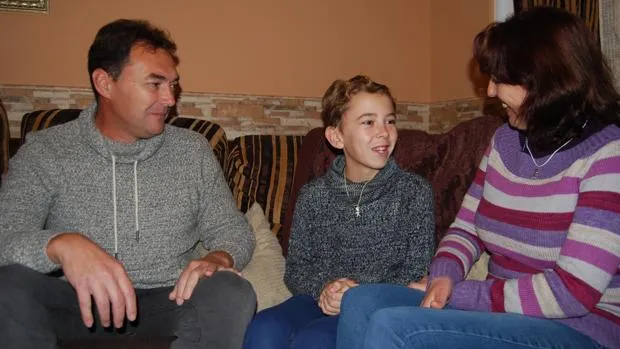Samuel suffers Wolfram syndrome, a ailment that produces multiple pathologies such as diabetes and blindness.
In Spain there are only fifty people affected by Wolfram syndrome, a neurodegenerative disease, of those cataloged as rare, which causes multiple pathologies to those who suffer from them throughout their life, including: tachycardias, blindness, deafness, diabetes, alterations of the urinary apparatus or multiple neurological symptoms.
The young man of Dos Hermanas, Samuel Cotán López, 12 years old, is one of those affected by this rare disease for which there is no cure or treatment.
The first symptoms of his illness appeared when at the age of two he was diagnosed with type one diabetes.
From there, his health was getting worse.Tachycardia and vision problems alert the doctors who had been attending it until, after numerous tests, they confirmed at the end of 2014 that the ailments Samuel had been carrying in recent years were a consequence of Wolfram syndrome.
"When the doctor told us it was a total chaos, we were wishing to get home to search the Internet what that disease was," recalls his mother, Ana María López.That disease that they had never heard of before is a syndrome that causes various and serious anomalies as the years go by and whose origin is genetic.
The probability of suffering from this rare pathology is minimal, but not impossible.These parents of the Nazarene municipality know that, without knowing it so far, they were both carriers of this altered gene, something uncommon, causing the youngest of their three children to develop the disease.
Thus, to the type one diabetes that Samuel has diagnosed since he was two years old, a supraventricular paroxysmal tachycardia, an insipid diabetes and optical atrophy, in addition to the first symptoms of a possible deafness, also common pathology among those who suffer from those suffering from thissyndrome.
Effects of pathology.Samuel only has a 20% vision, suffers tachycardia and presents deafness symptoms
The despair of these parents is such that, since they knew the consequences of the disease and the deterioration suffered by those who suffer from it, they have undertaken a campaign to raise funds and publicize this syndrome to citizenship, in order to enhance and favorYour research.
In Almería, Dr. Gema Esteban Bueno, coordinator of the multidisciplinary team of this syndrome in Spain and coordinator in Andalusia of the Spanish Federation of Rare Diseases (Feder), has been investigating and analyzing closely to those affected by this disease and presides, presides,In fact, the National Association created for the investigation and help of this disease.
In a conversation held with this newspaper, he explained that, for now, there is no specific treatment for this ailment although it works daily to try to advance in this regard.Currently, there are two clinical trials that could begin shortly, one in the United States and one in the United Kingdom, although the group of Spanish researchers is completely coordinated with both, especially with the latter that is waiting for European funds to putunder way.
support Samuel
While the scientific part continues its course, in two sisters Samuel's family fights every day to give this child a better quality of life.«Our purpose is to get a treatment, either.If at least the disease will not evolve anymore and stay as it is now, for us it would already be a triumph, ”says his father, Manuel Cotán.Precisely, one of the things that most worries this family is the loss of vision suffered by the minor, since only 20 has leftpercent.Even so, and within what fits, Samuel tries to make a normal life.He goes to the institute where his first high school studies and a couple of afternoons a week attends singing classes.
His name and his case are already resonating, practically, throughout two sisters.Allegados, friends and neighbors have turned to this family to help them sell bracelets, pendants and keychains with which to raise funds.Even the former partners of Samuel del Ceip Valme Coronada dedicate a good part of their free time in the recreos to make these bracelets, in a completely voluntary way."We have no words or we will have life to thank all the help and affection we are receiving," these parents are unleashed, who say they will not stop until they find a treatment that improves their child's health.


